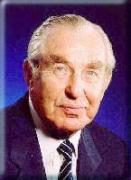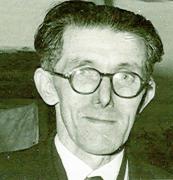|
|
||||||||||||||||||||||||
 |
Featured person
Recently added |
Chaim Herzog (1918 - 1997): |
||||||||||||||||||||||

|
Chaim Herzog was born at 185 Clifton Park Avenue, Belfast. His father was a rabbi, Yitzhak HaLevi Herzog, who was appointed Chief Rabbi of Ireland in 1919, whereupon the family moved to Dublin; he was later (1935) to be appointed Chief Rabbi of Palestine (Ashkenazim community), and after 1948 Chief Rabbi of Israel. His wife Rabbanit Sarah, Chaim's mother, was a founder of the national women’s religious movement, Emunah.
Chaim was acquainted and friendly with the highly distinguished Israeli diplomat and scholar Abba Eban who lived in Belfast.
Chaim Herzog was educated at Wesley College in Dublin, and moved to Palestine in 1935, where he studied at the Merkaz Harav Kook and the Hebron Yeshivot, while also attending the "Jerusalem Law Classes", set up by the British Mandate Power in 1920, in the Evelyn de Rothschild School. He was also active in the Haganah, a Jewish military organisation. In 1938 he moved to England to study at University College, London, where he graduated in law, and at Cambridge University; he was admitted as a barrister by Lincoln's Inn.
In 1943 he was commissioned Second Lieutenant by the Royal Military Academy, Sandhurst. He served as a tank commander and was wounded; he also served as Head of British Military Intelligence in northern Germany, and on demobilisation held the rank of Lieutenant-Colonel. He had been involved in the liberation of concentration camps, and organised the intelligence system for tracking Nazi leaders - including Himmler, whom he identified.
He returned to Palestine where he was an intelligence officer for the Jewish Agency, liaising with the then mandated power, the United Kingdom. He served as Operations and Intelligence officer of the 7th Armoured Division in the 1948 War of Independence, participating in the battle of Latrun to open the road to Jerusalem. In July 1948, Prime Minister David Ben-Gurion called on Herzog to help establish the Division of Military Intelligence, first as the deputy to Isser Be'eri and later as Chief Intelligence Officer. In this position, Chaim Herzog built and led the establishment of Israeli Defence Forces Military Intelligence.
From 1950-1953 he served as Military Attaché in Washington DC, then for one year in Ottawa. On his return to Israel in 1954 he served as Commander of the Jerusalem Brigade and later Head of Intelligence of the Israeli Defence Forces until 1962, when he retired with the rank of Major-General, and opened a private law practice. During the Six Day War in 1967 he served as a military commentator for Kol Israel (Israel Radio).
In 1975 Herzog was appointed Israeli ambassador to the United Nations. He gave a remarkable address to the General Assembly in November 1975, criticising a controversial UN General Assembly Resolution. This address was later incorporated in a book, Speeches That Changed The World. The Resolution was subsequently repealed. In 1981 he was elected to the Israeli Knesset for the left-leaning "Alignment" party. In 1983 the office of President of Israel became vacant and Herzog was elected by a ballot of all Knesset members, despite the right-leaning majority then in power. He was to serve two five-year terms, the maximum permitted, and the first President to do so; at his second election he was unopposed.
As President he was very active, travelling widely through the world on behalf of the state: he was the first Israeli President to visit the White House, to visit China, and to visit Germany. On a tour of Pacific nations he addressed a total of 15 parliaments. Domestically, he strove to enlarge the President's role, which in Israel is largely ceremonial, by making public declarations on issues that leaders in government would not, or could not, address. For example, he argued in favour of greater rights for the Druze and Arab populations in Israel; he employed the Presidential pardon in a number of controversial legal cases; and during his term of office, indecisive election results led to six changes of government and four changes of Prime Minister. Herzog thus often had to play the role of behind-the-scenes arbitrator and he played a key role in the process of naming a government, notably in 1984 and 1988, when he guided the formation of national unity governments.
Little slipped under his notice: he was one of the few prominent figures in Israeli politics to comment regularly on Israel's high incidence of fatal automobile and truck accidents. By late 1992, drivers had caused 20 times more fatalities in the previous five years than had died during the Palestinian uprising, some 2,300 people.
In 1985 he paid a state visit to Ireland, including his birthplace of Belfast, Dublin where he visited Wesley College and opened the Irish Jewish Museum, and Sneem Culture Park in Kerry, where he unveiled a modern polished-steel Israeli sculpture, in honour of his childhood friend, Cearbhall Ó Dálaigh, the fifth President of Ireland.
After stepping down as President, Herzog, who had been described by The New York Times as "probably...more influential and popular than any previous Israeli President", remained an active figure, as speaker, as a journalist and in business. He published a number of books on international politics and diplomacy, military history, Israeli and Jewish history, as well as a personal memoir. (His younger brother, Ya'akov, born in Ireland in 1921, also had an outstanding career in Israeli government and political service.) Herzog helped develop the Centre for Middle East Studies and Diplomacy at Ben-Gurion University of the Negev in Be'er Sheva which is now named after him. On his death on April 17th in Tel Aviv, he was honoured, by amongst many other countries, the USA, where the House of Representatives unanimously approved a resolution mourning his passing. Of his four children, son Yitzhak after working in the family max firm, entered politics; he was a Minister in the Israeli government and subsequently Leader of the opposition Labour Party.
| Born: | 17 September 1918 |
| Died: | 17 May 1997 |
| Richard Froggatt |
| Acknowledgements: Wesley McCann |


Home | Our Policies | Plaques | Browse | Search | Sponsors | Links | Help | Contact
Privacy & Disclaimer | Cookie Policy | Site Map | Website Design By K-Point
© 2024 Ulster History Circle









